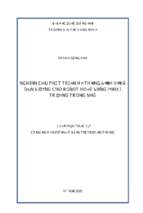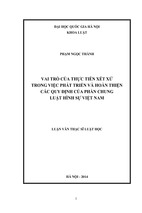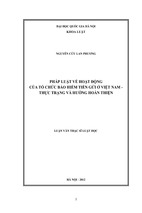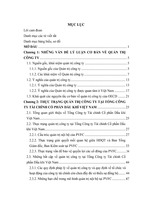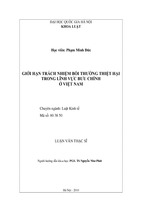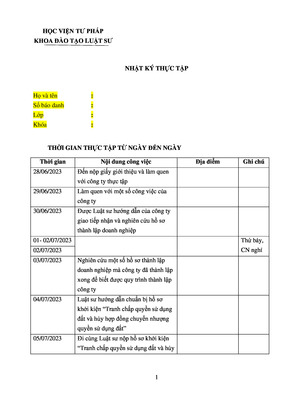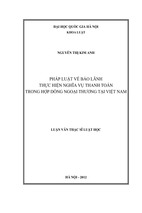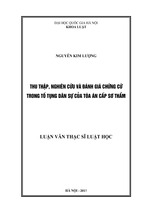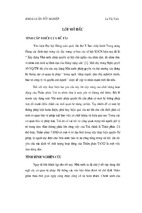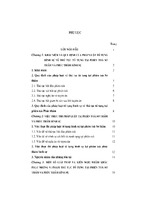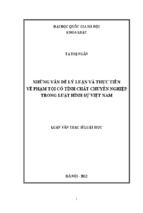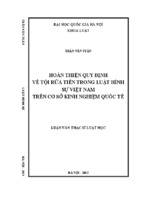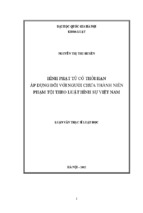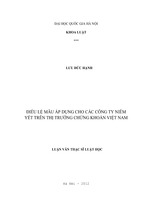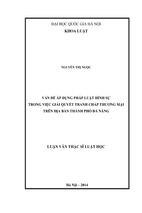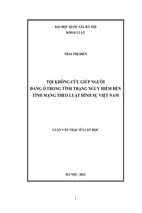HO CHI MINH CITY UNIVERSITY OF LAW
FACULTY OF INTERNATIONAL LAW
-----------***-----------
NGUYỄN PHẠM MỸ NGỌC
STUDENT ID: 1853801013128
DISPUTE RESOLUTION
BY ARBITRATION IN ENGLAND
EXPERIENCE FOR VIETNAM
BACHELOR THESIS
School year: 2018 - 2022
Supervisor:
Ph.D Phan Hoài Nam
Ho Chi Minh City – Year 2022
HO CHI MINH CITY UNIVERSITY OF LAW
FACULTY OF INTERNATIONAL LAW
-----------***-----------
NGUYỄN PHẠM MỸ NGỌC
STUDENT ID: 1853801013128
DISPUTE RESOLUTION
BY ARBITRATION IN ENGLAND
EXPERIENCE FOR VIETNAM
BACHELOR THESIS
School year: 2018 - 2022
Supervisor:
Ph.D Phan Hoài Nam
Ho Chi Minh City – Year 2022
DECLARATION
I declare that this thesis is the result of my research, which is implemented under the
supervision of Ph.D Phan Hoai Nam, ensures honesty, and complies with rules and
regarding quotation of the note of references. Therefore, I hereby take full responsibility
for this declaration.
LIST OF ABBREVIATIONS
ADR
Alternative Dispute Resolution
LCIA
London Court Of International Arbitration
New York Convention
The 1958 New York Convention on the
Recognition and Enforcement of Foreign
Arbitral Awards (New York Convention)
UNCITRAL
United
Nations
Commission
on
International Commercial Law
VIAC
Vietnam International Arbitration Center
WTO
World Trade Organization (WTO)
TABLE OF CONTENTS
6
INTRODUCTION
1. Problem statement
1
2. Literature review:
6
3. Purpose of the study
10
4. Objectives and Scope of the Study
12
4.1 Objectives of the study
12
4.2 Scope of the study
12
5. Research methodologies
14
6. Thesis structure
15
CHAPTER 01: OVERVIEW OF ARBITRATION
16
AND DISPUTE RESOLUTION BY ARBITRATION UNDER ENGLISH
LAW
16
1.1 Theoretical issues relating to dispute resolution by arbitration
16
1.1.1 Definition of arbitration
16
1.1.2 Characteristics of dispute resolution by commercial arbitration
20
1.1.3 Types of arbitration
29
1.1.4 The role of arbitration
Error! Bookmark not defined.
1.2 Dispute resolution by arbitration under English law
1.2.1 The history background of Arbitration Act in England
1.2.2 Regulations on arbitration agreement
36
36
39
1.2.3 Regulations on arbitral proceeding
46
1.2.4. Regulations on arbitral award
49
1.3 The London Court of International Arbitration (LCIA)
CONCLUSION CHAPTER 01
53
55
CHAPTER 02 PRACTICAL APPLICATION OF LAW ON ARBITRATION IN
ENGLAND AND RECOMMENDATIONS FOR VIETNAM
57
2.1 Practical application of law on arbitration in England governing arbitration
agreements and recommendations for Vietnam
57
2.1.1 Caselaw: Heifer International Inc v Helge Christiansen & Ors
57
2.1.2 Experience from England and recommendations for Vietnam
60
2.2 Practical application of law on arbitration in England governing arbitral
proceedings and recommendations for Vietnam
67
2.2.1 Case Law: Atlas Power v National Transmission
67
2.2.2 Experience from England and recommendations for Vietnam
70
2.3 Practical application of law on arbitration in England governing arbitral awards
and recommendations for Vietnam
76
2.3.1 Caselaw: Westacre Investments INc v Jugoimport SPDR Holding Co.
Ltd
76
2.3.2 Experience from England and recommendations for Vietnam
78
CONCLUSION CHAPTER 2
87
THESIS CONCLUSION
88
INTRODUCTION
1.
Problem statement
Arbitration was practiced during Marco Polo’s time during the 1200 as well as
amongst the Phoenician and Greek traders during the third millennium B.C. around 300
BC.1 In the trend of globalization and economic integration, the wave of dispute
resolution by arbitration in developed and developing countries is rising rapidly. In
multinational deals, arbitration continues to be the primary dispute resolution method.
In 2019, 89% of cases were resolved in London. Statistics from the London Court
of International Arbitration (LCIA) reflect the arbitration activity in London.he number
of arbitrations submitted to LCIA in 2019 hit a record high (406). LCIA has not yet
released the 2020 annual case report, but the report stated that there has been an increase
in new cases in the first quarter of 2020. It is predicted in the media-the prolonged
COVID19 crisis “will undoubtedly lead to more cases”.2 Due to restrictions on travel
and face-to-face meetings, a major impact of the COVID19 pandemic is the shift towards
virtual audiences.
London is not only home to one of the oldest and leading arbitral institutions, the
London Court of International Arbitration (LCIA), and the prominent London Maritime
Arbitrators Association (LMAA), it was also found to be the preferred seat in the 2021
1
Melisa Oleschuk, “The history of arbitration in the United Kingdom, the United States and its evolution into an
international mechanism”, May 16 2020, The History of arbitration in the United Kingdom, the United States and
its evolution into an international mechanism. (linkedin.com) (access 27/6/2020).
2
Muskaan Rawat, “Recent trends in commercial arbitration in the UK”, 2021, Recent trends in commercial
arbitration in the UK | VIA Mediation Centre (access 27/6/2022).
1
International Arbitration Survey3 where 54% of respondents chose London as their
preferred seat. Whilst this varied by region, London was the top choice for respondents
from Africa (69%), Europe (76%), Middle East (78%) and North America (66%).4
Commercial conflicts are growing more and more often and have a very complex
nature due to the fervor and competitiveness of the industry. Due to the need to respect
the right to choose one's own method of dispute resolution, the legislation governing
commercial dispute settlement must be created to suit these needs. Respect the parties'
agreements, resolve disputes promptly, cheaply, and efficiently, and make sure the
judgments and decisions of the conflict settlement agency are followed.
In Vietnam, the economic arbitration system was established in the context of a
centralized, bureaucratic and subsidized economy. This system is set up from the central
to the district level and operates almost like a court trial. Until the 1990s, over nearly 30
years of operation, economic arbitration had revealed its shortcomings and proved
ineffective and unsuitable for a market-oriented economy as a result of the policy. reform
of our State in the 1990s.5 The commercial arbitration system has been developed as a
socio-professional organization since Decree No. 204-TTg dated April 28, 1993 on the
3
Queen Mary University, “2021 International Arbitration Survey: Adapting Arbitration to a Changing World”,
2021, https://arbitration.qmul.ac.uk/research/2021-international-arbitration-survey/ (access 27/6/2022).
4
Fiona Cain Charlotte Mullis, “Arbitration Clauses: 10 reasons why you should consider English Law and a
London-seated Arbitration for Dispute Resolution”, April 01 2020,
https://www.haynesboone.com/news/alerts/arbitration-clauses-10-reasons-to-consider-english-law-for-disputeresolution, (access 27/6/2022).
5
Dương trọng hậu, “Những chặng đường phát triển của trọng tài thương mại ở Việt Nam” (The development stages
of commercial arbitration in Vietnam), Số chuyên đề Pháp luật về Trọng tài thương mại, Tạp chí Dân chủ Pháp
luật, Bộ Tư pháp.
2
organization of the Vietnam International Arbitration Center. Ordinance No.
08/2003/PL-UBTVQH of February 25,2 2003, created a unified legal basis for
arbitration institutions to operate on the basis of the two Decrees above.
In order to serve Vietnam's extensive international integration, overcome the
limitations and shortcomings of the Ordinance on Commercial Arbitration 2003, Law on
Commercial Arbitration 2010 was approved by the 12th National Assembly, 7th session.
dated June 17, 2010, replacing the Ordinance on Arbitration 2003, completed a step on
institutional organization and commercial arbitration activities in Vietnam.
Law on Commercial Arbitration 2010 was promulgated with many new
regulations in line with the Model Law on International Commercial Arbitration of the
United Nations Commission on International Commercial Law (UNCITRAL), in line
with international practices on arbitration.6 The legal basis for the dispute resolution by
arbitration has been promulgated by the State and gradually improved. The
Government's Decree No. 63/2001/ND-CP dated July 28, 2011 detailing and guiding the
implementation of a number of articles of the Law on Commercial Arbitration (amended
and supplemented by Decree No. Decree No. 124/2018/ND-CP dated September 19,
2018) and Resolution No. 01/2014/NQ-HDTP dated March 20, 2014 of the Judicial
Council of the Supreme People's Court guiding the implementation of a number of
provisions of the Commercial Arbitration Law. In addition, there are provisions of the
Civil Procedure Code 2015 on procedures for dealing with business and commercial
6
Đoàn Trung Kiên & Nguyễn Thị Vân Anh, “Giải pháp hoàn thiện pháp luật về trọng tài thương mại ở Việt
Nam”(Solutions to perfect the law on commercial arbitration in Vietnam), Tạp chí Nghề luật, 2020, 06/2020,
p.7.(The solutions on Vietnamese Law on Commercial Arbitration 2010).
3
matters related to arbitration activities, the Law on Civil Judgment Execution 2008
(amended and supplemented in 2014) provides for the enforcement of arbitral awards.
In recent years, the number of arbitration centers, the number of arbitrators, and
the number of disputes resolved at arbitration have continuously increased. That
contributes to reducing the court's adjudication load, effectively implementing the Party
and State's policy on encouraging the settlement of disputes outside the court in the spirit
of Resolution No. 49-NQ/TW dated June 2, 2005 of the Politburo on Judicial Reform
Strategy to 2020. According to statistics, the whole country has 490 arbitrators and 23
commercial arbitration centers. Vietnam International Arbitration Center (VIAC) has
149 arbitrators, accounting for nearly 40% of the total number of arbitrators.The number
of dispute cases that the arbitration centers accept to settle has increased by 30%
compared to 2011, 2012, specifically by 2017 the arbitration centers have accepted 2,145
cases and issued 1848 arbitral awards, in which the Vietnam International Arbitration
Center (VIAC) accepted and settled 226 cases, an average of nearly 60 cases/year.7 In
particular, according to the statistics of the Departments of Justice where the arbitration
centers are located (Hanoi, Ho Chi Minh City) and the Can Tho Commercial Arbitration
Center, in 2018, the arbitration centers accepted 31,831 cases, issued 29/387 judgments.8
7
VIAC, “Thống kê hoạt động giải quyết tranh chấp năm 2018”(Statistics of dispute resolution activities in 2018),
2018,
https://www.viac.vn/thong-ke/thong-ke-hoat-dong-giai-quyet-tranh-chap-nam-2018-s32.html
(access
27/06/2022).
8
Bộ Tư Pháp, “Số liệu thống kê tính đến ngày 30/11/2019 theo Phụ lục V Báo cáo về hoạt động của trọng tài
thương mại của Bộ Tư pháp” (Statistics as of November 30, 2019 according to Appendix V Report on commercial
arbitration activities of the Ministry of Justice), 2020, https://sotuphap.hochiminhcity.gov.vn/trong-tai-thuongmai/-/asset_publisher/lbn2TgQGNGeA/content/hoi-nghi-so-ket-thuc-hien-%C4%91e-an-nang-cao-nang-luc-vahieu-qua-hoat-%C4%91ong-cua-trong-tai-thuong-mai-%C4%91en-nam-2020-tai-thanh-pho-ho-chi-minh-va-boiduong-k?_101_INSTANCE_lbn2TgQGNGeA_enableXemTheoNgay=true (access 27/6/2022).
4
In addition to the achievements, the law on commercial arbitration still has many
shortcomings in practice. Such deficiencies are associated with not only competent
authorities but also enterprises.
Firstly, regarding the arbitration agreement, the name of the Law on Commercial
Arbitration 2010 does not adequately describe the full scope of its jurisdiction, which
may make it difficult for subjects to apply the law, and may even make our law less
appealing to investors' investment from abroad. Even for domestic actors, it is simple to
assume that the Law on Commercial Arbitration 2010 does not apply to disputes in other
particular civil domains without conducting a complete and in-depth analysis of the
arbitration law. The Law on Commercial Arbitration authority is overly limited in its
application and advocates for expanding the jurisdiction of arbitration to include cases
involving civil, labor, and domestic conflicts,...
Secondly, with regard to arbitral proceedings, Vietnamese legislators define the
seat of arbitration as a geographical location rather than a juridical seat of arbitration.
Therefore, when COVID-19 pandemic appears, there is a chance that the online arbitral
ruling will not be recognized or enforced in Vietnam and would be revoked for violating
the arbitration process.
Last but not least, in terms of arbitral awards, any of the following situations will
result in the cancellation of an arbitral award: the award violates the fundamental
principles of Vietnamese law. Due to its ambiguity, this clause has led to arbitrary
annulments of arbitral judgements, which is inconsistent with New York Convention and
several developed countries.
Thus, this thesis with the topic “Dispute resolution by arbitration under
English law and experience for Vietnam” aims to analyze the English Arbitration Act
1996 and current Vietnamese regulations on arbitration in order to provide
5
recommendations based on England, international treaties and foreign countries’
experience.
2. Literature review:
As the Law on Commercial Arbitration 2010 came into effect, many studies on
the dispute resolution by arbitration have been recorded. At present, there have been
many research thesis on the social promotion regime and documents providing and
supplementing information and knowledge about this legal issue are relatively various
and beneficial. The documents include scientific articles, research thesis of scholars,
prestigious international organizations, and qualified researchers in the country. Each
document with different scopes, aspects of research, strengths are quality sources,
valuable reference for the topic. Some typical thesis can be listed as:
Duong Van Hau (2021), “Những vấn đề lý luận và thực tiễn của trọng tài thương
mại Việt Nam” (Theoretical and practical issues of Vietnam's commercial arbitration),
Justice - Legislative Journal, 17(7). The content of the work includes the main issues (i)
Concepts and methods of commercial dispute resolution; (ii) An overview of the history
of dispute resolution in Vietnam before the commercial arbitration law; (iii) Current legal
provisions on commercial arbitration; (iv) Issues with Vietnamese commercial
arbitration. The work provides the author with not only the general theory but also the
practice of commercial arbitration in Vietnam. In this paper, the author focuses on
analyzing, assessing, and commenting on some breakthroughs on the provisions of the
Law on Commercial Arbitration 2010 by comparing with the practices to enlighten the
performance of arbitration in reality. The author Duong Van Hau appreciates the
progressive changes in Vietnam’s Commercial Arbitration Law. However, the study has
not yet been deeply researched on the foreign arbitration, the application’s challenges,
and the remaining shortcomings.
6
Chapter 7 International commercial dispute resolution (2017), Textbook on
International Trade and Business Law, Publisher Youth Publishing House. In this
textbook, the textbook has researched and analyzed general theoretical issues about
international trade and business law which are divided into 02 parts: Part 01:
International Trade Law; Part 02: International Business Law (including international
commercial dispute). However, the textbook only provides a comprehensive overview,
not in-depth research on arbitration. After studying the above work, the author has the
most general knowledge about international commercial arbitration to analyze more
specifically about arbitration.
VIAC (2020), Thực tiễn thi hành Luật Trọng tài tại Trung tâm trọng tài quốc tế
Việt Nam (Practical implementation of the Law on Arbitration at the Vietnam
International Arbitration Center), Publisher VIAC. This document summarizes the
current successes and shortcomings in the implementation of the Law on Commercial
Arbitration 2010 that Vietnamese international arbitration centers. Through this
document, it helps the author to gather the successes and inadequacies of arbitration in
2020. Therefore, the document is for reference only to professional knowledge as well
as the actual implementation process.
In addition, there are other research paper on arbitration introduced in specialized
journals, notably Nguyen Thi Hoa (2021), “Hoàn thiện pháp luật trọng tài ở Việt Nam
hiện nay” (Completing the arbitration law in Vietnam today), Research - Legislative
Journal, 17(7)). The paper outlines the inadequacies of arbitration in Vietnam, then
compares it with foreign laws and gives lessons learned to improve Vietnamese law. The
recommendations of this paper help the author have an overview of arbitration in
Vietnam as well as orient the article to be more objective.
7
Do Van Dai (2018), Pháp luật trọng tài thương mại (Commercial Arbitration
Law), Publisher Hong Duc, Ha Noi. This monograph provides the author with an
overview of the issue of arbitration: (i) The concept of commercial arbitration; (ii)
Arbitration characteristics; (iii) The analysis of judgments is difficult and takes a long
time. Besides, the article also uses and cites many other judgments to clarify some legal
issues related to arbitration. For the convenience of monitoring, when a judgment has
many different legal issues, the curriculum is divided into different topics, so a judgment
sometimes appears in two or more different topics. The appendix at the beginning allows
readers to know the important topics including two parts in which Part I deals with the
case of agreement to select Vietnamese arbitration and Part II deals with the case of
agreement on selection of foreign arbitrators. However, this monograph does not analyze
the details of arbitration agreement, arbitral proceedings, and arbitral awards.
Besides the works with direct research on this issue, there are many works on
arbitration. Among them, it can be mentioned as the chapter “Trọng tài thương mại”,
Giáo trình Luật thương mại quốc tế (Commercial Arbitration - International Commercial
Law Textbook of Ho Chi Minh City Law University; the paper “Trọng tài thương mại
quốc tế và vấn đề áp dụng” (International Commercial Arbitration and its Application)
of Ngo Quoc Chien and Nguyen Hoang Anh (2021) publisher Research & Legislative
Research, (7); bachelor thesis “Các biện pháp khẩn cấp tạm thời trong luật trọng tài
thương mại tại Việt Nam và kinh nghiệm từ nước ngoài” (Interim urgent measures in
commercial arbitration law in Vietnam and experience from abroad) of Dang Quoc
Chuong (2014); bachelor thesis “Pháp luật về thẩm quyền của trọng tài thương mại”
(Law on jurisdiction of commercial arbitration) of Bui Thi Yen Trinh (2018); the paper
“Công nhận và cho thi hành phán quyết trọng tài nước ngoài - kinh nghiệm từ Công ước
New York 1958 và Luật Mẫu Uncitral” (Recognition and enforcement of foreign arbitral
awards – experience from the 1958 New York Convention and the Uncitral Model Law)
8
of Nguyen Thi Thanh Ngan (2021); Nong Quoc Binh (2018), Đặc điểm của điều khoản
thỏa thuận trọng tài thương mại quốc tế và kinh nghiệm cho các bên ký kết (Features of
international commercial arbitration agreement terms and experiences for signatories),
Publisher Hanoi Law University,... The above research works have the general principles
underlying the arbitration. In general, the studies on arbitration in the above documents
are of high generality, which is a premise for the study of arbitration in general and this
topic in particular.Nigel Blackaby & Martin Hunder (2015), International Arbitration,
Oxford. The author has analyzed (i) the overview of international arbitration in detail;
forms of arbitration; (ii) arbitration agreement; (iii) applicable law; (iv) establishment
and organization of the Arbitral Tribunal; (v) powers, obligations and authority of the
arbitral tribunal; (vi) conducting arbitration proceedings; (vii) arbitration in investment
agreements; (viii) the arbitral award; (ix) object to the arbitral award; (x) recognition and
enforcement of arbitral awards. Accordingly, in addition to providing general theory and
legal regulations of different countries in the world, the work also provides judgments
related to theoretical issues. From there, the work helps the author to analyze in detail
each relevant judgment on arbitration agreements, arbitral proceedings and arbitral
awards.
Sanders (1997), “Arbitration: Encyclopedia of International and Comparative
Law”, U.National BC University Journal, 17(8). This paper provides an overview of the
arbitration agreement, arbitral proceedings and arbitral awards, analyzes the calculation
formulas, advantages and drawbacks of the arbitration measure. The paper introduces
the relevant legislation concerning these regulations in England and the EU. Therefore,
through this paper, the author can analyze and compare with Vietnamese Law on
Commercial Arbitration 2010. Thus, the author could propose some suggestions to
improve the Vietnamese Commercial Arbitration Law relating to the mentioned issues
in evaluatitration.
9
Rudolf Kahn (1987), “Arbitration in England and Germany”, A study in
Comparative Legislation and Conflict of Law Journal, (27). By analyzing and comparing
legal provisions as well as case laws on the definition, jurisdiction, and arbitration
agreement in England and Germany. Although the article was researched at the time the
Arbitration Act 1996 had not been issued, studies on arbitration agreements and
definitions of arbitration in England and Germany can be considered as necessary
documents for the author to analyze and expand.
O. Kahn-Freund (2018), “Commercial Arbitration and the conflict of law: Recent
Developments in England”, U.B.C Law Review, 07(27). The paper expands the overview
of arbitration in the and the issues of conflict of law, as well as the development trends
of arbitration in England. The study of the document provides a basic understanding of
development trends and issues in English law through specific regulations and practices.
From there, learning progressive regulations that can be applied to Vietnamese law.
Schwab and Walter (2001), The History of Arbitration, Publisher U.B.C Center.
This book provides the history of arbitration development of the world in general and
many developed countries about arbitration in particular. In addition, this book also
explains why arbitration was formed and is evolving.
Generally, the above documents, whether directly or indirectly related to the
topic, help the author to have an overview of arbitration. Thus, this thesis will attempt to
address the issues that have been left unsolved, covered, or discussed from the previous
studies.
3. Purpose of the study
The topic has one main objective: To research and explain the scientific views,
theoretical bases, judgments and legal practices on dispute resolution by arbitration
10
under English law, specifically on the issues of arbitration agreement, arbitral
proceedings and arbitral awards in order to improve the legal framework on Vietnamese
arbitration law. With the above objective, the research topic will solve the following
tasks:
Firstly, clarify the basic theoretical issues related to arbitration such as: concepts,
definitions, nature, method and role of arbitration).
Second, study the history, legal basis and practices of arbitration on matters of
arbitration agreement, arbitral proceedings and arbitral awards under English law by
reasoning, analyzing legal provisions and judgment under the provisions of the
Arbitration Act 1996.
Third, evaluate the legal provisions of Vietnam and inadequacies in practical
application of these provisions in arbitration, specifically on arbitration agreement,
arbitral proceedings and arbitral awards. From there, the author will summarize the
shortcomings and unrecognized points from the legal framework of Vietnam and
consider progressive aspects from the law of England as well as the UNCITRAL Model
Law, the New York Convention, and several developed countries.
The last but not least of this study is to recommend contributing to the
development and improvement of the legal framework of Vietnam; propose solutions to
make these regulations feasible and effectively applied in practice. Thereby, this will
create a sustainable legal environment, protecting the legitimate rights and interests of
the subject of investment and business, especially when they choose to resolve disputes
by arbitration.
11
4. Objectives and Scope of the Study
4.1 Objectives of the study
This thesis studies on the dispute resolution by arbitration (including arbitration
agreements, arbitral proceedings and arbitral awards). On the basis of the research, the
authors present general theories and relevant legal bases, especially issues of conditions
on arbitration agreements, arbitral proceedings and arbitral awards under English law.
From there, it will serve as a basis for learning from England's experience to apply the
recommendations in practice to solve the actual inadequacies in accordance with the
political, economic and social conditions of Vietnam. .
4.2 Scope of the study
In terms of content: The thesis studies on researching issues related to arbitration,
focusing mainly on the provisions of arbitration agreement, arbitral proceedings and
arbitral awards under English law. In addition, the thesis also studies on researching,
analyzing and evaluating case laws on matters of arbitration agreement, arbitral
proceedings and arbitral awards. From there, learning from England's experience on the
above issues to improve commercial arbitration law of Vietnam.
Regarding space: This thesis is researched based on the study of Vietnamese law
and English law. Besides, this thesis also studies the regulations of several developed
countries (France, Northern Ireland, Germany, New Zealand,...). The selection of
England for research in order to find solutions and recommendations for Vietnamese law
comes from the following reasons:
The choice of England comes from the fact that England has the most developed
economy, attracting many commercial and civil investment and business activity,
especially, the trend of current development is the settlement of disputes by arbitration.
12
Without a doubt, one of the most often chosen locations for the seat of arbitration is
England and Wales. London's stronghold status is a result of its long and extensive
commerce history, which also gave rise to the complex, adaptable, and English common
law and the proficiency of English legal professionals, both of which have gained the
respect of business parties. English law is founded on sound ideas, respects a contract's
autonomy, is open and transparent, and has a predictability of conclusion, legal certainty,
and justice that are not always present in other jurisdictions.
For arbitrations with seats in England and Wales, the Arbitration Act of 1996 (the
Act) is applicable. The Act, which went into effect 25 years ago, drastically altered
English Arbitration Act by enhancing party autonomy and reducing judicial intrusion.
Although the Arbitration Act 1996 is currently being reviewed, the general consensus is
that it is still adequate for its intended purpose and does not require a significant
overhaul, although it has been suggested that future legislation to try to improve English
Arbitration Act 1996 may address issues like a process for summary dismissal for
meritless claims and defenses, guidance on confidentiality, and narrowing the ability to
appeal on a point of law. Therefore, the experience from the issues of arbitration
agreement, arbitral proceedings and arbitral awards learned from English law will be
extremely useful and highly applicable in Vietnamese law practice.
In terms of time: The study with the provisions of the law of Vietnam will be
conducted on the sources of data collected from 2003 up to now. Due to the fact that the
Government's Decree No. 63/2001/ND-CP dated July 28, 2011 detailing and guiding the
implementation of a number of articles of the Law on Commercial Arbitration (amended
and supplemented by Decree No. Decree No. 124/2018/ND-CP dated September 19,
2018) and Resolution No. 01/2014/NQ-HDTP dated March 20, 2014 of the Judicial
Council of the Supreme People's Court guiding the implementation of a number of
provisions of the Commercial Arbitration Law. In addition, the study of the legal
13
regulations of some countries was conducted on the sources of documents obtained from
the Arbitration Act of several developed countries, especially the Arbitration Act 1996
of England.
5. Research methodologies
Throughout the thesis, the author will utilize three main research methods:
analytical, comparative, and synthetic. These three research methods are determined not
to be set to isolation but in interweavement.
The analytical method is conducted primarily in Chapter 1 to research and
evaluate the definitions, nature, role of arbitration and the regulations of England's
Arbitration Act 1996 on agreement arbitration, arbitral proceedings and arbitral awards.
However, it is noted that the analytical method is also applied in Chapter 2 for analyzing
the case law in England as well as the regulations of Arbitration Act 1996 and other
countries’ legislations on arbitration.
The comparative method is implemented for comparing case laws, regulations of
Arbitration Act 1996 and the Law on Commercial Arbitration 2010, thereby
emphasizing the significance and necessity of the amendment included in the Law on
Commercial Arbitration 2010 to the matter of arbitration agreement, arbitral proceedings
and arbitral awards. In Chapter 2, the comparative method is essential to be applied in
comparing the competition legislation of Vietnam and England to propose
recommendations.
The synthetic method is used to combine analyses and comparisons, emphasizing
the issues that need to be resolved from a legal perspective. From there, learning
experience from England and other countries to make recommendations to improve
Vietnam's Law on Commercial Arbitration 2010. In addition, the author also used the
14
- Xem thêm -


